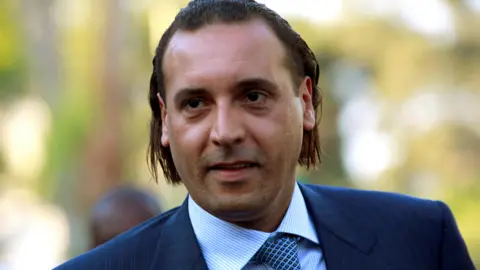Hannibal Gaddafi, the youngest son of the late Libyan leader Muammar Gaddafi, has finally been released from detention in Lebanon after nearly ten years behind bars.
His release on Monday, November 10, 2025, marks the end of a long and controversial chapter in the complex relations between Libya and Lebanon.
Hannibal was first detained in December 2015 after being abducted from Syria, where he had been living in exile. His arrest was linked to allegations that he possessed information about the disappearance of prominent Lebanese cleric Musa al-Sadr, who vanished in 1978 during an official visit to Libya. At the time of al-Sadr’s disappearance, Hannibal was just two years old—too young to have had any involvement, a fact that human rights groups repeatedly highlighted over the years.
According to Lebanese judicial officials, the decision to release him came after the courts agreed to reduce his bail from an initial sum of US $11 million to approximately US $900,000. Following the payment of this amount, the court also lifted restrictions on his movement, paving the way for his release. Reports indicate that a Libyan delegation played a crucial role in the final negotiations that secured his freedom.
Hannibal’s imprisonment without trial had long drawn condemnation from international rights organizations, including Human Rights Watch, which criticized Lebanese authorities for what it described as “arbitrary detention” and called for his immediate release. His case had also become a symbol of the lingering political and judicial complexities that followed Libya’s 2011 revolution and the fall of the Gaddafi regime.
Also Read; Museveni Confirms Arrest of Missing Kenyan Activists
Sources close to his family say Hannibal is now considering leaving Lebanon for a third country, where he intends to reunite with relatives and begin a new chapter away from public attention. However, his release is not expected to end the controversy surrounding the fate of Imam Musa al-Sadr, a case that remains politically sensitive and deeply rooted in Lebanon’s modern history.
For Lebanon, the move is being viewed as an effort to ease diplomatic tensions with Libya, which have strained bilateral relations for decades. Observers suggest the decision reflects a shift toward reconciliation, particularly as both nations attempt to stabilize their political landscapes after years of internal turmoil.
Hannibal’s freedom comes at a time when the broader North Africa region continues to grapple with the legacies of past regimes and ongoing power struggles. His release serves as a reminder of the far-reaching consequences of Libya’s tumultuous history and the enduring impact of the Gaddafi family name in regional politics.



